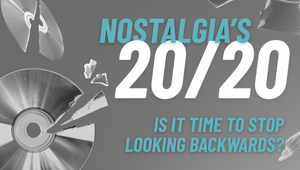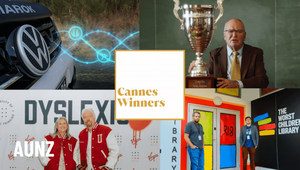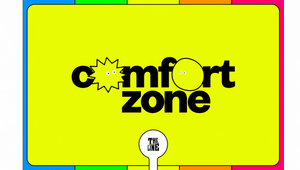
5 Minutes With… Dion Appel

DDB Group Melbourne recently announced the appointment of Dion Appel into the role of managing director, DDB Melbourne, as the Group also confirmed the acquisition of Appel’s Lifelounge Agency.
Dion, a co-founder of Lifelounge Agency, has nurtured and successfully grown the business into a multi award-winning specialist marketing business since launching in 1999. The agency - and Appel - have become synonymous with leading edge youth communication and marketing.
He’s an unstoppable force, whose enthusiasm for all things creative extends far beyond the office: Appel is a board member and director of The Melbourne International Comedy Festival, sits on an RMIT Advertising course industry advisory committee and is a member of the Victorian committee for The Communications Council.
Here he catches up with LBB’s Larissa Meikle to discuss his plans for the Melbourne office and the biggest trends currently influencing young Australians…
LBB> What is your vision for the Melbourne office and how have you been implementing it since coming on board in early April?
Dion Appel> My vision is to create great work, have fun and make money, and all in that order.
I’m achieving this through creating a high-energy working environment surrounded by engaged, effective, efficient and above all, great talent. The result of this will be a highly motivated team that collectively drives the culture of our organisation whilst leveraging the broader DDB Group’s resources to solve client’s business problems.
As a result, DDB Melbourne will become Australia’s number one agency. Our point of difference will be leveraging leading consumer insights via proprietary market segmentation data that puts the client customer at the center of the solution. This will directly link to our DDB Group vision of becoming the world’s most loved agency.
From a consumer insights perspective, I have brought my expertise and learnings from the youth category and existing Lifelounge clients; Transport Accident Commission, Village Cinemas, Austereo and CUB and extended that segmentation specialty to DDB Melbourne clients such as; Telstra, Westpac, AHM and more recently Momentum Energy and Porsche.
In the Australian market, I have plans to develop our segmentation platform for other key consumer markets including the Silver Surfer retirees and household decision makers, centennials and more. There are also plans to expand the youth segmentation expertise to assist our offices in the Asia Pacific region namely emerging markets like China and India.
LBB> You have the responsibility of integrating the Lifelounge Agency's business and segmentation model into the group. Together with DDB's scale and infrastructure, what kind of point of difference can you now offer up?
DA> An understanding of the consumer/the person that we are ultimately talking to is the cornerstone of all effective marketing and to do this we draw on ten years of Lifelounge segmentation expertise in line with client’s business objectives. It’s another very powerful business tool at our disposal and it most definitely gives us a point of difference. As part of DDB, it simply means that we’ll be offering these insights on a grander scale. DDB are now segment specialist in an otherwise generalist category that no other agency can deliver. That is point of difference, homerun smashed #outofthepark.
LBB> What excites you about working closely what DDB Melbourne Group CCO Darren Spiller and group managing director Dave Brown?
DA> Dave and Daz are both very experienced operators respectively and above all great guys who are driving a culture of creativity at all levels of the business.
Together we all live and breathe our DDB Group vision to become the world’s most loved agency. Our mantra is that creativity is the most powerful force in business and we know good things happen when the right people come together. We are curious, creative and charismatic which delivers results to consumers and builds enduring bonds with our clients.
It excites me to work with in an environment that is just as committed to its people as it is to its output; with an understanding that people and relationships are what delineate a business from a great business.
LBB> Can you name some of the biggest trends influencing Aussie Millennial at the moment?
DA>They are first generation digital natives. They have grown up digital, not adopting it later in life, unlike previous generation. They are always connected, always on, switched to silent at best. All are not new insights, but significant ones.
They spend a lot of time and energy creating the best version of themselves only for others to like. All their experiences are documented and “shared” on the social media “scoreboard”. It’s a very public way to live. It’s a little like being a D grade celebrity and creates high levels of anxiety. This same social connectivity has big implications for marketers as product reviews and endorsements are shared and influence shifts from companies to peers.
They are worried about the future. They are faced with new cultural challenges such as global terrorism, career and housing instability and increased exposure to illegal drugs and higher levels of mental health problems such as depression. They’re staying home with mum and dad for longer and because of their perception that they’ll almost never own their own homes, there’s a shift away from consumerism to valuing knowledge, experience and social connection above all else.
Extremism is another emerging trend – they’re taking the “work hard, play hard” sentiment of youth to new levels with puritan, non-drinking and organic weekdays punctuated by drug and alcohol induced debauchery on weekends. The ultimate healthy-hedonists.
There are many implications for marketers with regards to the above trends and the impact they have on the way that this segment consumes and digests marketing information.
LBB> Which brands do you think ‘get’ youth culture and why?
DA> To be able to ‘get’ youth culture, to make meaningful connections with youth, a brand needs to understand them. Brands need to introduce themselves and become part of their lives in lasting, authentic ways. Young Australians won’t accept a brand without meaning and depth. The brand needs to understand where it fits in their broader cultural context; otherwise it’s just a fad. We call this process of successful integration with youth culture, ‘cultural infusion’.
There’s the functional relevance of a brand to consider but also the congruity between the values of the brand, the content and culture. Red Bull is a good example of a brand doing it well. This brand isn’t necessarily associated with action sports but its association with it the category is congruent with the brand values to “go further, go harder” and is also congruent with the life attitude of many Australians. Other brands that have nailed it are Google and more recently Uber whom have become part of our vernacular. And Apple and Nike.
LBB> What do brands need to understand about Aussie youth culture? What are your thoughts on ‘global youth’? Do "seas still seem like puddles" considering youth access to travel and tech?
DA> Socrates nailed it in 410BC when he claimed “Youth today love luxury. They have bad manners, contempt for authority, they show disrespect for elders and love chatter in place of exercise.”
No generation is mysterious; you just have to look at the formative events in the first couple of decades of their lives to see how they might have been shaped.
Youth have grown up with cultural uncertainty; global terrorism, financial crisis, climate change, an entrepreneurial culture, political disillusionment, 24/7 always on media cycle and so much more.
Adding to this they are experiencing significant life stage transition and change as they; move out of home, start new relationships, discovering sexuality and dating, travel, worry about expectations from friends all whilst completing the final stage of their brain formation.
Now that we understand what makes them so complex, here’s what brands need to understand about their culture to achieve relevant connection. Listen to them, understand them, and speak their language in their environment. Empower them to participate, play and pass on your brand message as their own. They are personable and expect to be engaged on their terms. Win their minds and you will win their hearts. Be transparent, admit when you screw up and find a way to entertain. Life’s too short to be taken seriously 24/7.
LBB> You sit on the board of Directors for The Melbourne International Comedy Festival. How did this come about and what kind of insight and/or different perspective does this offer up?
DA> I’ve been fortunate enough to have been invited to sit on a number of boards and committees across education, health, the arts and entertainment industries. I’m passionate about giving back. After I reached my maximum term on the board of the Australian Centre for the Moving Image, a former board member invited me to join him on the Melbourne International Comedy Festival Board.
It’s a real honour and I’m now helping to navigate the largest arts festival in the southern hemisphere and third largest comedy festival in the world, behind Edinburgh and Montreal, to achieve new heights.
As the Melbourne International Comedy Festival brand continues to grow and evolve, I’m part of a talented team charted to help build brand equity, continue to grow the festival in size and stature both in Melbourne and overseas.
LBB> Are there any upcoming campaigns you are excited to work on (that you can mention)?
DA> DDB Melbourne recently won Porsche and I’m pretty excited about the campaigns we’ll be working on in partnership there. This is the space to watch as we prepare to launch the new Porsche 911.
We also just launched a new campaign for Westpac’s every day banking that was very exciting too. We shot a series of online tutorials that informed and entertained a younger audience about card-less withdrawals. For those that picked up on the hidden clues, real money was dispensed from Westpac ATMs. It went off!!















